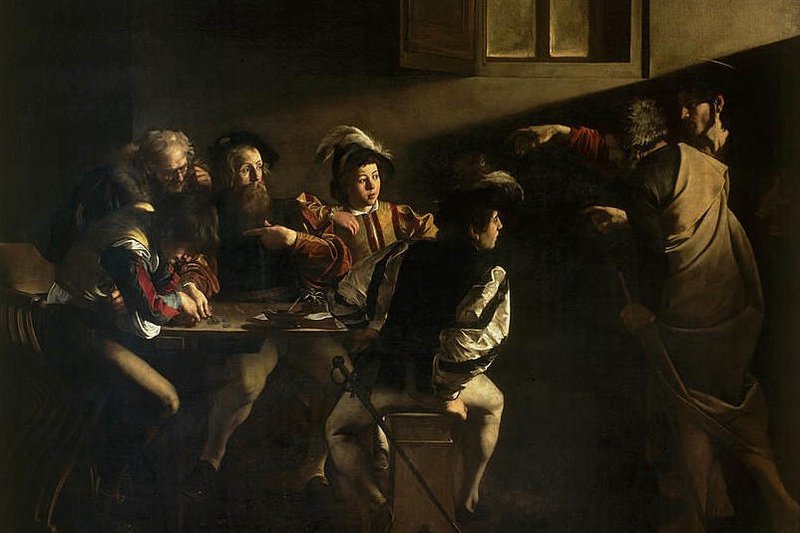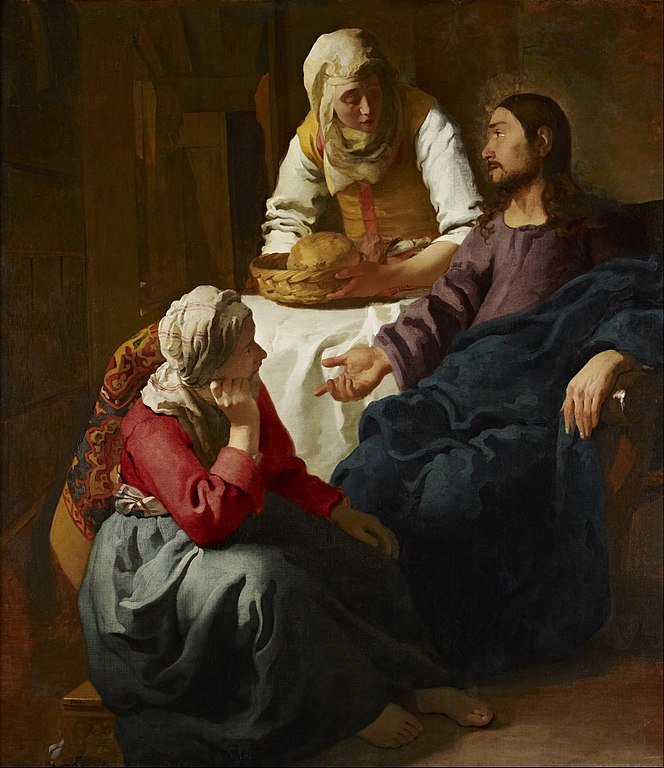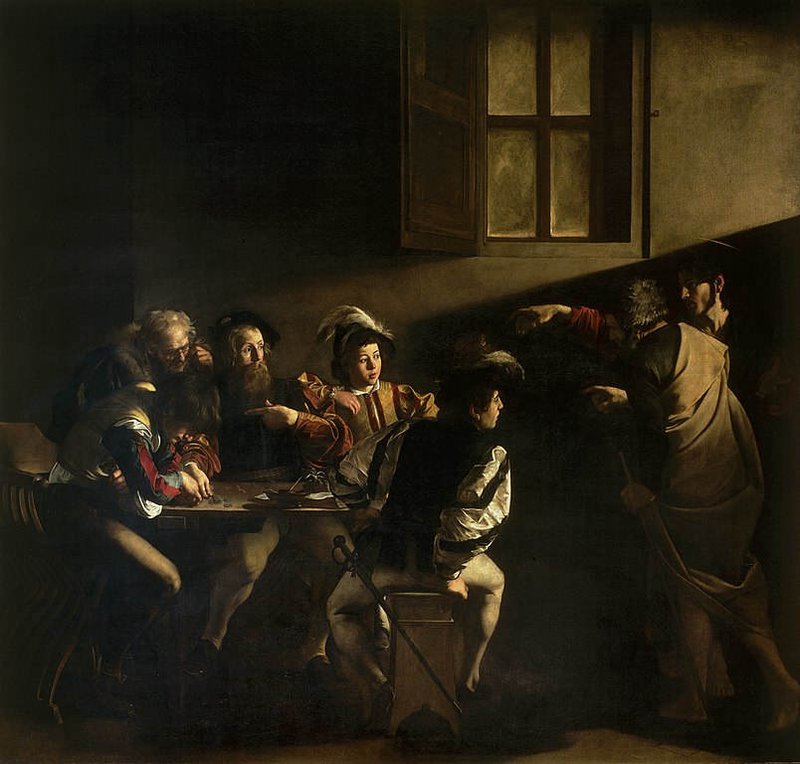
What a truly wonderful thing it is to be called by Jesus!
Think of the places in the Gospels where it’s recorded he has called someone. When Jesus comes to the home of Mary and Martha just after their brother Lazarus has died, he speaks first to Martha. Then the text says, “she went her way and secretly called Mary her sister, saying, `The master has come and is calling for you.’” Then we read, “As soon as she heard that, she arose quickly and came to Him” (John 11:28- 29). Mary arose immediately when as she heard Jesus was calling her. As she mourned for her brother, she knew only Jesus could help her, and now when he called her, she came.

“Christ in the Home of Mary and Martha,” by Johannes Vermeer - in the Public Domain
When the master calls and speaks to us, if we would only come and hear, what wonderful things we might know and hear in his presence! Mary and Martha became friends of Jesus, just like their brother whom Jesus raised from the dead. If we hear his call and come to heed his words, we, too, may become his friends, for he said, “You are my friends if you do what I command you” (John 15:14). Jesus told this to his disciples immediately after he’d told them, “Greater love has no one than this, that he lay down his life for his friends.” This is what Jesus was going to do, and did do, for his own—for those whom he called as he called Mary, Martha and Lazarus. And it’s his love for us which compels us to follow him.
We know that following him is not the work of a day or moment, but a way of life. In living such a life we will encounter any number of trials and difficulties, especially in this world which is so hostile to the way of Jesus for it seems everything conspires against our following him. But speaking of that call that a man or woman, boy or girl, originally hears, a call which then goes from the ear to the heart, drawing and leading such a person to follow him, the Apostle Paul wrote, “I pray God your whole spirit and soul and body be preserved blameless unto the coming of our Lord Jesus Christ. Faithful is he that calls you, who also will do it” (I Thessalonians 5:23-24). We may doubt we have the strength and faith to follow, but if we will just remember that when we’re weak, our very weakness gives God’s grace and strength an opening to come in. We can’t do it, but He can. As Paul wrote, God is the faithful one, even when we falter. He’s called and if we heed and follow, he’ll give us what we need to “do it.”
You and I cannot be the victor in all the trying situations we encounter, but Christ is always the victor! If the one who is calling us is the one who called Lazarus out of the grave, as we read in the Gospel record, then he can bring us to life, as well! “The people therefore that was with him when he called Lazarus out of his grave, and raised him from the dead, bare record” (John 12:17). The power that raised Lazarus is a mighty power—this is the power of Jesus calling!
The call of Jesus to accept him as Lord and to accept what he did for lost and desperate people when he came, has been the theme of every true minister of the Gospel since the Lord gave his apostles his great commission to go into all the world to share his message of redemption with every creature. This call has been the subject of so many great hymns of the Christian church. I’ve referred to such a hymn in our title for today, “Softly and Tenderly Jesus is Calling.” Have you ever heard it? It begins,
Softly and tenderly Jesus is calling,
calling for you and for me;
see, on the portals he's waiting and watching,
watching for you and for me.
The hymn, written in 1880 by Ohio composer Will Thompson, is much beloved. It was sung, for example, at the funeral service for the assassinated civil rights leader Martin Luther King, Jr. at Ebenezer Baptist Church in Atlanta on April 8, 1968. It was also a recurring theme song in the film The Trip to Bountiful (1985), an Oscar-winning movie taken from the stage play and screenplay by Texan Horton Foote. The film is about the adventures of an elderly woman longing to return one last time to her girlhood hometown, Bountiful, Texas. It’s sung beautifully by Cynthia Clawson in this 4-minute clip from the film. I hope you can listen to her sing this inspiring hymn!
There’s a moving story about “Softly and Tenderly” told by Ernest Emurian, a student of the history of hymns. In 1899 when the world-famous preacher, Dwight L. Moody, lay on his deathbed in his Northfield, Massachusetts home, its composer—who was Moody’s friend— made a special visit to inquire about his condition. The attending physician refused to admit him to the sickroom until Moody heard them talking just outside the bedroom door. Recognizing Thompson’s voice, he called for him to come to his bedside. Taking the poet-composer by the hand, the dying evangelist said, “Will, I would rather have written ‘Softly and Tenderly Jesus Is Calling’ than anything I have been able to do in my whole life.” It’s said Moody was singing it when he died.
But now let’s look at the hymn—maybe we can understand why it has been so beloved.
Softly and tenderly Jesus is calling,
calling for you and for me;
see, on the portals he's waiting and watching,
watching for you and for me.
Jesus said he didn’t come for those “who need not a physician,” that is, those who do not see that they are sick because of their estrangement from God and his goodness. We all are in such a state, but the wish to save ourselves, the wish to try to be all we can be entirely on our own with no reference to our Maker, hides our true condition from us—it makes us blind spiritually. But when we realize this, then we are ready to come to the Great Physician, who heals us by means of his substitutionary atonement on the cross. There he himself pays the penalty of death our sins have earned—freeing us, healing us—by his sacrifice for us.
But notice Jesus is said to softly and tenderly call us—he didn’t come to condemn, to harshly point the finger of shame at us, but to call us in utmost love and kindness—softly and tenderly—to come to him. As the Gospel puts it, “For God sent not his Son into the world to condemn the world; but that the world through him might be saved.” (John 3:17).
And he’s not calling to us from far away, but from very near, just from the very portals of our houses, of our doors, of our hearts, if we would only hear him. It’s as Jesus says, “Behold, I stand at the door, and knock: if any man hear my voice, and open the door, I will come in to him, and will sup with him, and he with me” (Revelation 3:20). We thus see he pleads for us to hear, to come. There—that close—he waits and watches for us to respond to the call of the Gospel, which is Jesus’ call. As Paul the Apostle put it, “he called you by our gospel, to the obtaining of the glory of our Lord Jesus Christ” (II Thessalonians 2:14).
We can see that the refrain of the hymn speaks repeatedly of “home”:
Come home, come home;
you who are weary come home;
earnestly, tenderly, Jesus is calling,
calling, O sinner, come home!
Since Adam and Eve were expelled from the Garden there’s a sense in which we all find ourselves exiled—estranged from “home” and the purpose for which we were made. The long-ago Christian leader, Augustine in his famous Confessions, on its very first page, wrote in addressing God, “You have made us for Yourself, and our hearts are restless until they rest in You.” Jesus came to lead us home to our Heavenly Father. When we turn to Christ and trust in what he has done for us, dying for our sins and rising from the dead to be our Lord, we can at last come home. Jesus is calling us to that very thing—to come home.
There is a weariness in life for us all because we are not living in the world as it was made to be and we are not in ourselves who we ought to be. But Jesus came to call us, weary as we can be, to himself and to his Father saying, “Come unto me, all ye that labor and are heavy laden, and I will give you rest. Take my yoke upon you, and learn of me; for I am meek and lowly in heart: and ye shall find rest unto your souls” (Matthew 11:28-29). If we’re weary and heavily laden, burdened with care and guilt through all our shortcomings and so estranged from God, Jesus is calling us to come to him that we might have rest—and return to God. We are sinners, but Jesus came to save sinners! He calls us to come home through the good news of the Gospel!
The second stanza of the hymn underlines Jesus’ love and tenderness toward unhappy sinners:
Why should we tarry when Jesus is pleading,
pleading for you and for me?
Why should we linger and heed not his mercies,
mercies for you and for me?
His mercies are spoken of here. As the Bible tells us, “He does not deal with us according to our sins, nor repay us according to our iniquities” (Psalm 103:10). “Thou art a God ready to pardon” (Nehemiah 9:17). “His mercies are new every morning” (Lamentations 3:22-23).
The third stanza reminds us that it is God’s love which is behind it all—a love he has promised and which will have no end, for not only does the Gospel speak of his great mercies and readiness to pardon—but it promises us these loving mercies are forever. This is his gift to all who heed his call—life forever with the lover of our souls, our Maker and Redeemer—“And this is the promise that he hath promised us, even eternal life” (I John 2:25).
O for the wonderful love he has promised,
promised for you and for me!
Though we have sinned, he has mercy and pardon,
pardon for you and for me.
Let’s finish our time with this hymn and the theme of Jesus’ softly and tenderly calling us to turn to God, with a picture of Jesus calling one of his first twelve—the Apostle Matthew. The call of Matthew is depicted below showing Jesus’ hand extended, beckoning to him, great sinner that he is, busy doing things that seemed to take him far from the work and life of the godly. Matthew is pointing to himself in disbelief as if to say, “You’re calling me, a despised publican, such a noted sinner?” But Jesus was calling him, even as he calls you, and me.

“The Calling of St. Matthew,” by Caravaggio, Public Domain, painted around 1600, in the Public Domain.
The Lord’s calling of Matthew is recorded in all three of the Synoptic gospels, but here it is from Mark 2:14-17:
And as he passed by, he saw [Matthew] Levi the son of Alphaeus sitting at the receipt of custom, and said unto him, Follow me. And he arose and followed him. And it came to pass, that, as Jesus sat at meat in his house, many publicans and sinners sat also together with Jesus and his disciples: for there were many, and they followed him. And when the scribes and Pharisees saw him eat with publicans and sinners, they said unto his disciples, “How is it that he eateth and drinketh with publicans and sinners?” When Jesus heard it, he saith unto them, “They that are whole have no need of the physician, but they that are sick: I came not to call the righteous, but sinners to repentance.” (KJV)
Jesus is calling a sinner to come home, and this sinner became the man who wrote the Gospel of Matthew. He knew he was spiritually very sick and desperately needed the great Physician. When he saw that Christ was not going to condemn or despise him—though this world despised and condemned him—he forsook all, for he saw all he was doing could not satisfy his heart which thirsted for peace and acceptance and the kind of embrace that nothing could shake. He found love and pardon and mercy from God that was only realized in Jesus Christ!
It’s a call—the one that goes out to us from Christ and which went out from Jesus to Matthew—not only to our ears, but deeper than that—to the heart. That we hear and respond is not because we are virtuous or pure, for we are not—we are, as the Bible says, “dead in our sins”—that is, dead to God. But the call of Jesus brings us to life, even as the Bible puts it:
And you He made alive, who were dead in trespasses and sins…[for] God, who is rich in mercy, because of His great love with which He loved us, even when we were dead in trespasses, made us alive together with Christ (by grace you have been saved),
-- Ephesians 2:1-5, NKJV
God has opened our hearts so we can respond to the call of Jesus—it’s the pure grace of God that we are able to do this; we cannot earn it or make ourselves respond, even as the Apostle Paul reminds us, “For by grace are you saved, through faith, and that not of yourselves” (Ephesians 2:8). When you hear his call and turn to him, then you come into his presence, and when you do, to put it in the words of another hymn writer, Dan Burgess, from his hymn, “In His Presence”: “You’ll find strength for every test, Perfect peace and perfect rest, In His presence.”
Can you think of other places in the Gospels where Jesus is seen softly and tenderly calling? Here are a few: think of Nicodemus in John 3:1-15, of the Samaritan woman in John 4, of blind Bartimaeus in Mark 10:46-52 and of the little girl in Luke 8:50-56.
Thanks be to God for his soft and tender calling to each of us! He came not to condemn you or me, but came instead that we might be saved and have new life in him! God bless you!
~ Paul